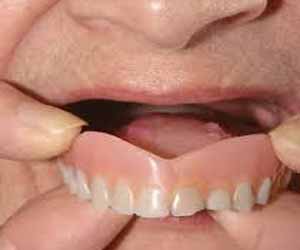- Home
- Editorial
- News
- Practice Guidelines
- Anesthesiology Guidelines
- Cancer Guidelines
- Cardiac Sciences Guidelines
- Critical Care Guidelines
- Dentistry Guidelines
- Dermatology Guidelines
- Diabetes and Endo Guidelines
- Diagnostics Guidelines
- ENT Guidelines
- Featured Practice Guidelines
- Gastroenterology Guidelines
- Geriatrics Guidelines
- Medicine Guidelines
- Nephrology Guidelines
- Neurosciences Guidelines
- Obs and Gynae Guidelines
- Ophthalmology Guidelines
- Orthopaedics Guidelines
- Paediatrics Guidelines
- Psychiatry Guidelines
- Pulmonology Guidelines
- Radiology Guidelines
- Surgery Guidelines
- Urology Guidelines
False teeth should be removed before general anesthetic procedure: BMJ Case Report

UK: Remove false teeth before a general anaesthetic else it could result in serious consequences, warn doctors taking a lesson from a recent case published in the BMJ Case Reports.
The case in question is of a 72-year-old who presented to the emergency department 6 days after a minor operation with difficulties in swallowing and coughing blood.
He had undergone a surgery to remove a harmless lump in his abdominal wall. It was only 8 days later that the doctors discovered dentures lodged in his larynx which were then removed in theatre.
Aside from experiencing considerable pain, bleeding, and swallowing difficulties, the oversight led to repeated hospital visits, additional invasive tests, blood transfusions, and eventually more surgery for the man.
The doctors describe how six days after abdominal surgery, the man turned up at A&E complaining of blood in the mouth and swallowing difficulties and pain, which had prevented him from eating solid food ever since.
Nothing in his test results prompted doctors to consider anything other than a respiratory infection and the side effects of having had a tube down his throat during his operation. He was therefore prescribed mouthwash, antibiotics and steroids, and sent home.
Two days later he returned with worsening symptoms. He had been unable to swallow any of the medicine he had been prescribed. He was admitted to hospital with suspected aspiration pneumonia--a severe chest infection usually caused by inhaling food or stomach acid or saliva into the lungs.
During this hospital stay, a diagnostic procedure to look at his throat and voice box revealed a semi-circular object lying across his vocal cords, which had clearly caused internal swelling and blistering.
When this was explained to him, the man revealed that his dentures, which consisted of a metal roof plate and three false teeth, had been lost during his previous hospital stay.
He then had emergency surgery to remove the dentures and was discharged after six days. But six days later bout of bleeding prompted his return. As tests revealed the bleeding had stopped, he was sent home, only to reappear 10 days later with the same problem.
After a couple of days, he was again discharged but returned six days later because of further bleeding. Tests revealed that he had internal wound tissue around the site of the blistering which was cauterised to prevent further bleeding. Because he had lost so much blood, he also required a blood transfusion.
He was discharged after two days, but returned again nine days later with further bleeding, which required emergency surgery as the source of the bleed was a torn artery in the wound.
A check-up a week after this procedure showed that the tissue was healing well, and six weeks later he had not needed further emergency care and his blood count was back to normal.
The authors note that this isn't the first documented case of dentures being inhaled while the anaesthetic is being infused.
"There are no set national guidelines on how dentures should be managed during anaesthesia, but it is known that leaving dentures in during bag-mask ventilation allows for a better seal during induction [when the anaesthetic is being infused], and therefore many hospitals allow dentures to be removed immediately before intubation [when a tube is inserted into the airway to assist breathing]," write the authors.
The presence of any false teeth or dental plates should be clearly documented before and after any surgical procedure, with all members of the surgical team made aware of what is to be done with them, they add.
"This case raises questions about perioperative care in patients with dentures, diagnostic decision-making in the emergency care setting and postoperative care after delayed removal of foreign bodies from the upper aerodigestive tract," concluded the authors.
To read the complete case report log on to http://dx.doi.org/10.1136/bcr-2019-230055

Disclaimer: This site is primarily intended for healthcare professionals. Any content/information on this website does not replace the advice of medical and/or health professionals and should not be construed as medical/diagnostic advice/endorsement or prescription. Use of this site is subject to our terms of use, privacy policy, advertisement policy. © 2020 Minerva Medical Treatment Pvt Ltd